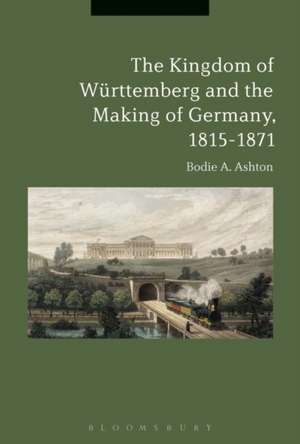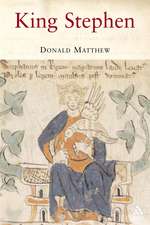The Kingdom of Württemberg and the Making of Germany, 1815-1871
Autor Dr Bodie A. Ashtonen Limba Engleză Hardback – 11 ian 2017
| Toate formatele și edițiile | Preț | Express |
|---|---|---|
| Paperback (1) | 237.28 lei 6-8 săpt. | |
| Bloomsbury Publishing – 25 iul 2018 | 237.28 lei 6-8 săpt. | |
| Hardback (1) | 772.98 lei 6-8 săpt. | |
| Bloomsbury Publishing – 11 ian 2017 | 772.98 lei 6-8 săpt. |
Preț: 772.98 lei
Preț vechi: 1112.45 lei
-31% Nou
Puncte Express: 1159
Preț estimativ în valută:
147.91€ • 161.31$ • 124.72£
147.91€ • 161.31$ • 124.72£
Carte tipărită la comandă
Livrare economică 24 aprilie-08 mai
Preluare comenzi: 021 569.72.76
Specificații
ISBN-13: 9781350000070
ISBN-10: 1350000078
Pagini: 240
Ilustrații: 5 bw illus
Dimensiuni: 156 x 234 x 18 mm
Greutate: 0.48 kg
Editura: Bloomsbury Publishing
Colecția Bloomsbury Academic
Locul publicării:London, United Kingdom
ISBN-10: 1350000078
Pagini: 240
Ilustrații: 5 bw illus
Dimensiuni: 156 x 234 x 18 mm
Greutate: 0.48 kg
Editura: Bloomsbury Publishing
Colecția Bloomsbury Academic
Locul publicării:London, United Kingdom
Caracteristici
Incorporates the wider, popular perspective on events of the time as well as tracing diplomatic developments
Notă biografică
Bodie A. Ashton is the Professional Academic Editor for the European Research Council-funded ReConFort project at the Universität Passau, Germany. He is also a Visiting Research Fellow at the University of Adelaide, South Australia, and has taught extensively at Adelaide and Flinders University of South Australia in modern European history, imperialism, colonialism, protest, and revolution.
Cuprins
List of PlatesList of MapsIntroduction1. States and the Nation in the Late-Eighteenth and Early-Nineteenth Centuries2. Independence and Early South German Particularism3. Models of German Unification, 1815-18484. The Years of Prophecy and Change, 1848-18495. Counterrevolution, Reaction and Reappraisals, 1850-18596. Six Years of Autumn, 1860-18667. The Unification of Germany, 1866-18718. Remembering and Forgetting Württemberg, 1871-1914ConclusionBibliographyIndex
Recenzii
Bodie A. Ashton makes an important contribution to the German and regional history of the 19th century with his book. It is recommended.
[The book] offers in a concise way a good overview of Württemberg's room for manoeuvre and initiatives with regard to the German Question between 1815 and 1871.
This comprehensive book represents nothing less than the current state of research on the history of nineteenth-century Württemberg, and it will surely find readers in the other remaining Mittelstaaten as well.
A succinct book, whose valuable contribution to the transfer of knowledge across different historiographies should be acknowledged.
This is a clearly presented, well-researched, and very readable account of the multifaceted role the middle-seized German state of Württemberg - the home of Friedrich Schiller, Hermann Hesse, and Albert Einstein - played in the process of German unification. Intimately familiar with the historiography, Bodie Ashton offers a fresh and interesting perspective on this rich topic.
This is a very welcome contribution to nineteenth-century German history. Bodie Ashton's new study of the small South-west German state of Württemberg retells the history of the movement for German unification from an unfamiliar vantage point. In calling into question some of the assumptions of an older body of literature, Ashton gives us the benefit of a more plural and more open-ended history of German unification, at the same time as demonstrating why some alternative ideals of the nation-state ultimately failed.
It is hard to give this book sufficient praise; lucid and thoroughly researched, it brings the past to life, and the sections on politics, economic growth (or the absence of it in southern Germany), and warfare are equally effective. If the unification of Germany came in a way that was unexpected (the author notes in closing), what came afterward was equally unpredictable. Summing Up: Highly recommended. Upper-division undergraduates and above.
[The book] offers in a concise way a good overview of Württemberg's room for manoeuvre and initiatives with regard to the German Question between 1815 and 1871.
This comprehensive book represents nothing less than the current state of research on the history of nineteenth-century Württemberg, and it will surely find readers in the other remaining Mittelstaaten as well.
A succinct book, whose valuable contribution to the transfer of knowledge across different historiographies should be acknowledged.
This is a clearly presented, well-researched, and very readable account of the multifaceted role the middle-seized German state of Württemberg - the home of Friedrich Schiller, Hermann Hesse, and Albert Einstein - played in the process of German unification. Intimately familiar with the historiography, Bodie Ashton offers a fresh and interesting perspective on this rich topic.
This is a very welcome contribution to nineteenth-century German history. Bodie Ashton's new study of the small South-west German state of Württemberg retells the history of the movement for German unification from an unfamiliar vantage point. In calling into question some of the assumptions of an older body of literature, Ashton gives us the benefit of a more plural and more open-ended history of German unification, at the same time as demonstrating why some alternative ideals of the nation-state ultimately failed.
It is hard to give this book sufficient praise; lucid and thoroughly researched, it brings the past to life, and the sections on politics, economic growth (or the absence of it in southern Germany), and warfare are equally effective. If the unification of Germany came in a way that was unexpected (the author notes in closing), what came afterward was equally unpredictable. Summing Up: Highly recommended. Upper-division undergraduates and above.











